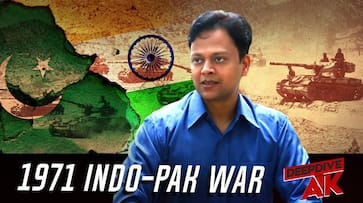The release of the state department volume on the 1971 conflict is a posthumous homage to the courage of the Indian Army which despite heavy odds and the might of the United States freed Bangladesh from Pakistani clutches. Abhinav Khare deep dives into the past to explain why New Delhi must consider whether steps to appease the US—will not disconcert Moscow.
Until 1971, Bangladesh was a part of Pakistan and was known as East Pakistan. They have always had the complaint that they have been left out from Pakistan’s development process. The final nail in the coffin was the imposition of Urdu as the official language despite Bengali being widely spoken in East Pakistan. The Pakistan army tried to subdue the movement. It was reported that they had resorted to mass killing and rapes to contain the dissent. There was a huge migration from East Pakistan to India and Mrs. Gandhi had in fact requested for American intervention as a war seemed inevitable. But America refused and had even threatened to cut off economic aid to India.
Since Pakistan was a part of CENTO and SEATO, it received America’s sympathy. Moreover, owing to the camaraderie between Russia and India, America felt that India’s victory would automatically translate to Soviet influence in Asia. Thus US asked for help from China and that happened via Pakistan and China took this opportunity to improve its relations with US.
Mrs. Gandhi toured the western countries to gain support but failed to do so. The pressure in East Pakistan was mounting, so to diffuse the same, Pakistan air raided six Indian Airfields in Kashmir and Punjab. USA had requested China to intervene as their intervention was not predicted by India. However, China backed out at the last minute fearing wrath from Soviet Union.
Also read: Catch and release of Hafiz Saeed puts Pakistan's integrity in question
India decided to go for a war despite no support from the west. Mrs. Gandhi took a bold move and on 9th August signed a treaty of friendship, peace and cooperation with Russia. Thus a fierce war broke out between India and Pakistan on 3rd December 1971. America’s proxy involvement in the war was becoming evident but even they feared the entry of Soviet Union in the war. They tried to pass a cease-fire against India in the UN Security Council but Soviet Union vetoed it despite mounting pressure. Thus, India continued to fight for protecting the interest of the now Bangladesh.
Russians even blocked America and China from helping Pakistan which eventually led to Pakistan surrendering and thus the war ending. Thus, a new nation called Bangladesh was born which came to be recognized by the world and later by Pakistan after signing the Shimla Agreement.
Today, India cannot bank on its past to expect any help from Russia. After all, nostalgia cannot be a viable foreign policy. With India tilting towards America now, how global politics shapes up after the recent paradigm shifts is something we all are waiting to see. Diplomacy shall be our tool now as a developing country like India cannot afford to snip its ties with any country.
About Abhinav Khare
Abhinav Khare is the CEO of AsiaNetNews Network and also the host of a daily show named Deep Dive with AK. AsiaNetNews is a leading media group of south India with highly valuable brands like AsiaNetNews, Suvarna News, Kannada Prabha, IndigoMusic, Indigo Radio, MyNation, NewsFast, IndigoXP Music lounges.
He is a proud father of two beautiful daughters and resides in Bengaluru with his loving family and a lifetime collection of books and gadgets. An avid traveller, he has already pinged more than hundred cities from 5 major continents around the globe.
A tech entrepreneur, who is passionate about policy, technology, economy and philosophy from ancient India. His favourite pastime is to research synergy between these facets of society. He earned his qualifications from the top 10 global universities; an MS Engineering from the ETH Zurich and an MBA Finance from the London Business School.
Last Updated Oct 17, 2019, 11:53 AM IST









![Salman Khan sets stage on fire for Anant Ambani, Radhika Merchant pre-wedding festivities [WATCH] ATG](https://static-gi.asianetnews.com/images/01hr1hh8y86gvb4kbqgnyhc0w0/whatsapp-image-2024-03-03-at-12-24-37-pm_100x60xt.jpg)
![Pregnant Deepika Padukone dances with Ranveer Singh at Anant Ambani, Radhika Merchant pre-wedding bash [WATCH] ATG](https://static-gi.asianetnews.com/images/01hr1ffyd3nzqzgm6ba0k87vr8/whatsapp-image-2024-03-03-at-11-45-35-am_100x60xt.jpg)


